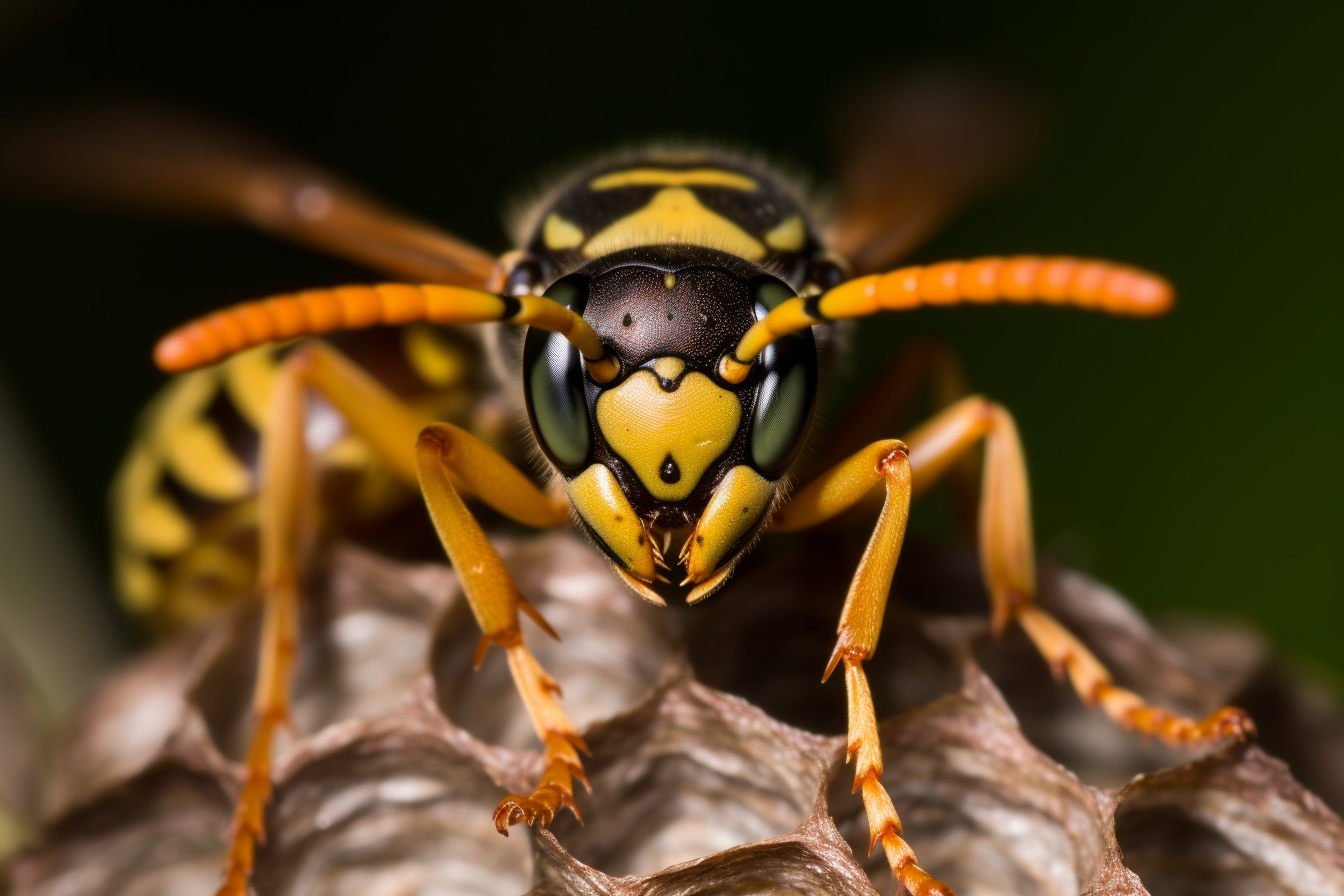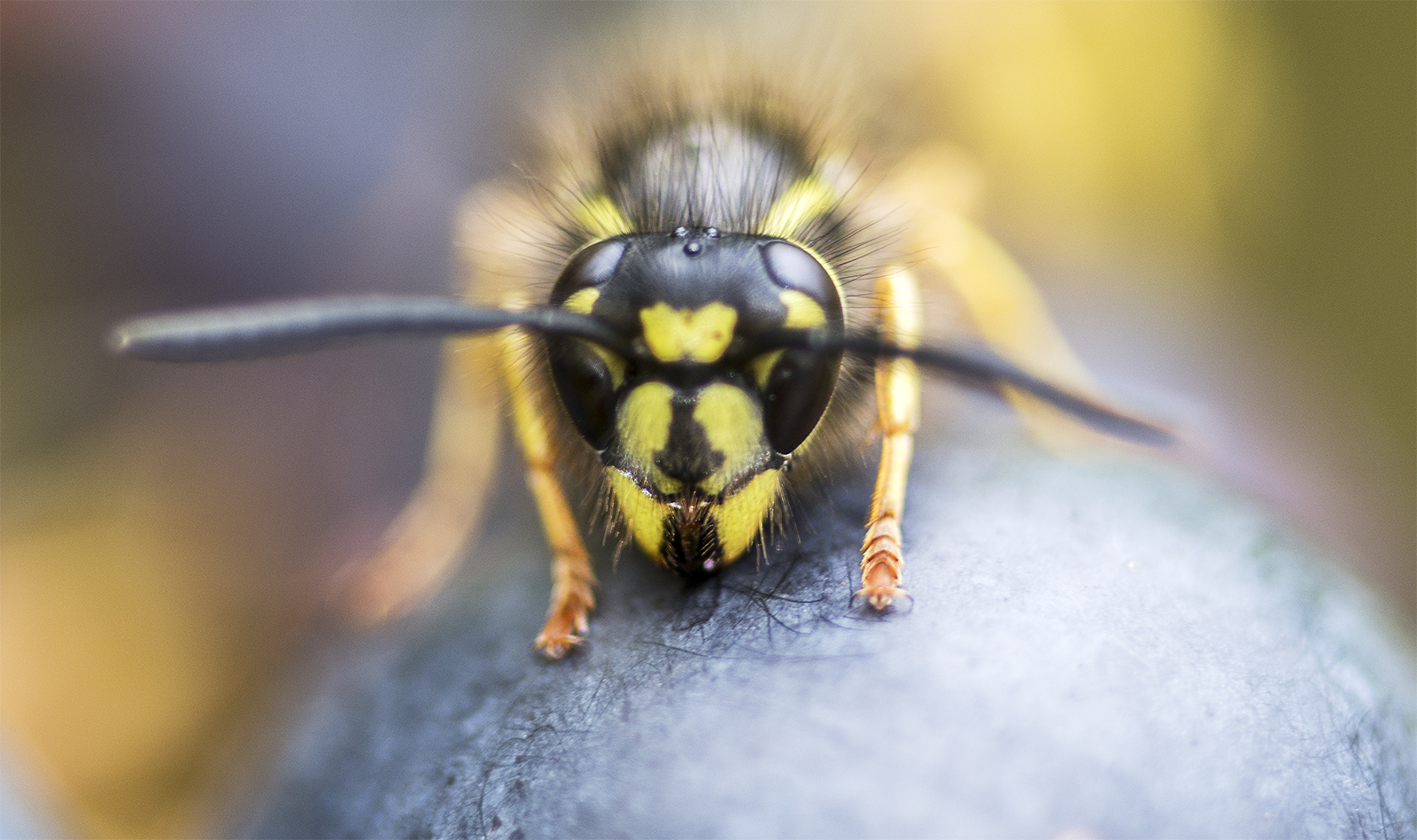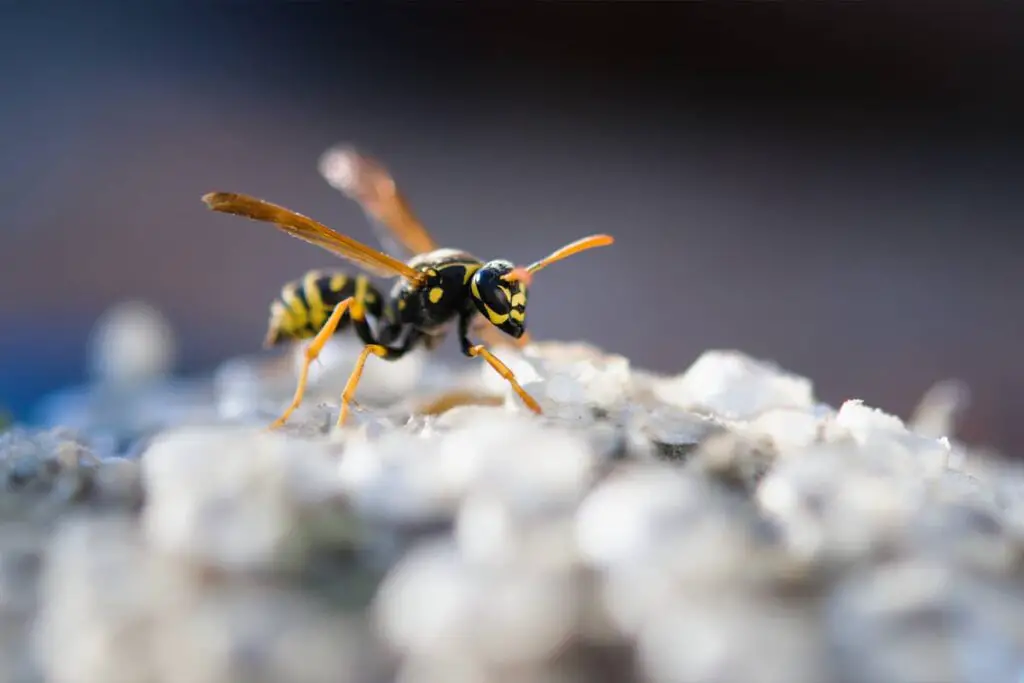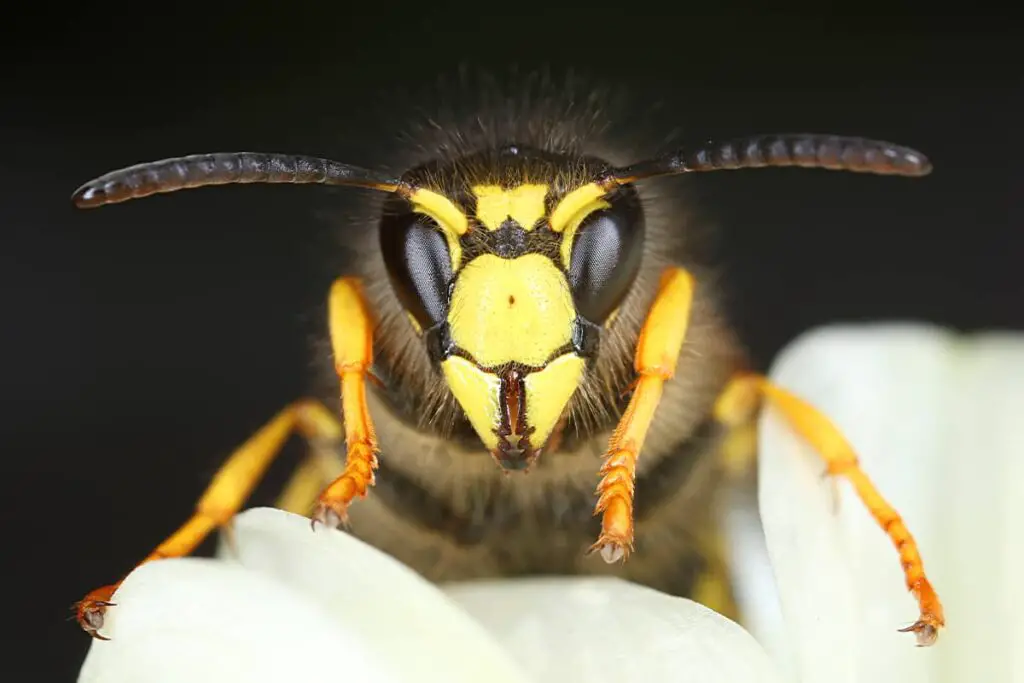
Based on how wasps can behave sometimes, it’s not surprising that many people wonder whether they can actually smell fear in humans, as these insects seem to be more aggressive when a person is nervous or scared. Just how worried should we be?
Although wasps possess great senses, such as smell, taste, and sight, there is currently no scientific evidence to suggest that they can directly sense fear in humans. However, some studies suggest that wasps may be able to detect pheromones released by animals when they are fearful or stressed.
Since wasps have an extremely sensitive sense of smell and taste, they can be attracted to humans when they detect food traces on our skin, or even our body odor! If a person is exhibiting nervous or fearful behavior, such as sweating or rapid movement, the wasp may interpret that as a threat or an opportunity to find a food source, which could potentially explain the seemingly aggressive behavior.
Can Wasps Smell Fear?
Although it is difficult to definitively say if wasps can smell fear, they do possess a keen sense of smell that enables them to detect pheromones released by frightened animals. When a person experiences fear, they release fear pheromones and hormones which wasps may detect. However, it is important to note that the absence of sudden movements or attempts to kill the wasp will likely prevent any aggressive reactions.
While some anecdotal evidence suggests that wasps can smell fear, there is a lack of scientific data to confirm this claim. When it comes to human pheromones, they are generally thought to be used for communication within, and sometimes between, species. As such, the idea that wasps can smell human fear seems contradictory, as presented by a Biology Stack Exchange discussion.
Though wasps are unable to truly “sense” fear, their excellent taste, smell, and sight enable them to detect the movements of potential threats. So there just isn’t sufficient research to conclude that wasps can sense fear. Instead, it could be the person’s fearful behavior, such as sudden movements, that causes the wasp to perceive them as a threat and potentially sting.
Insect Olfactory Systems
Insects possess complex and highly evolved olfactory systems, allowing them to detect and respond to a wide range of chemical cues in their environment. Wasps, as a significant group of insects, are no exception to this general principle. In this section, we will focus on the chemoreception capabilities of wasps and their relevance to the detection of fear-related cues.
Chemoreception in Wasps
Chemoreception is the primary method by which wasps detect chemical cues, such as odor molecules, in their environment. Their olfactory organs, typically located on their antennae, contain specialized sensory cells called olfactory receptor neurons (ORNs), which bind to specific odorant molecules and transmit the information to the insect’s brain for processing and interpretation Evolution of Insect Olfaction.
In wasps, these ORNs are housed in hair-like structures called sensilla, providing a large surface area for detecting a wide range of volatile compounds. The number of different ORNs present in a wasp species usually correlates with the sensitivity and specificity of their chemoreception abilities. This high degree of specialization allows wasps to effectively locate food sources, identify suitable nesting sites, and recognize potential threats or rivals.

While there is no clear evidence suggesting that wasps can directly “smell fear” in the same way that some insects, like bees, have been found to respond to fear-related pheromones in humans and other animals, their well-developed olfactory systems and chemoreception capabilities are likely sensitive enough to detect and respond to other associated cues. For example, wasps may be able to sense increased levels of carbon dioxide released by a frightened animal or subtle changes in the chemical composition of their environment. We give off a lot of signals when we’re stressed.
While it is not clearly established that wasps can specifically detect fear-related cues, their sophisticated olfactory systems and extensive chemoreception abilities allow them to effectively respond to a wide range of chemical signals in their environment. Further research may elucidate their sensitivity to specific fear-related cues and the potential implications for human-wasp interactions.
Fear in Humans and Animals
Fear is a fundamental emotion experienced by both humans and animals alike. It serves as a protective mechanism that evolved to alert us of potential threats, allowing us to react and avoid danger. While many of our fear responses are universal, some species-specific differences exist in how fear is perceived and communicated.
Pheromones
Pheromones are chemical signals produced by one individual and detected by another within the same species. They often play an important role in social communication, particularly in the transmission of fear between individuals. When a human or animal experiences fear, their body releases specific pheromones, which can then be detected by others nearby.
Insects, such as bees, have been found to detect fear pheromones released by animals, interpreting them as alarm signals. While wasps also have a keen sense of smell, there is no concrete evidence that they can specifically sense fear in the same way. Nonetheless, some studies suggest that wasps might be able to smell pheromones released by fearful animals.
Alarm Signals
Beyond pheromones, other alarm signals can communicate fear in animals. These signals can come in various forms, such as visual cues, auditory calls, or even changes in behavior. For instance, bees use a combination of both pheromones and specific behavior patterns to alert the colony of potential threats.
Wasps, on the other hand, may rely on their excellent vision and sensing abilities to detect threats in their environment. While there is no scientific evidence that wasps can sense fear directly, they are known to recognize and react to agitation or defensive behavior from their targets.
Wasps’ Reaction to Human Scent
While there is no clear scientific evidence that wasps can sense fear, they do possess great senses; such as smell, taste, and sight which allows them to recognize their surroundings and react to potential threats or food sources. It is important to understand how wasps may react to human scent and its potential impact on their behavior.
Wasps have an extremely sensitive sense of smell and taste, which helps them locate food or attractants even on human skin. Additionally, sudden movements or aggressive behaviors might provoke these insects to become defensive and sting out of self-preservation.
While wasps might not directly smell fear, it is crucial to acknowledge that they respond to human scent and other factors. Here are some factors that may influence their behavior:
- Perfumes and fragrances: Wasps may be attracted to certain fragrances or scents present in personal care products, such as perfumes, deodorants, or lotions.
- Foods and drinks: The scent of food, especially sweet or fruity odors, can attract wasps to humans.
- Body odor and sweat: Human sweat and body odor might contain pheromones which could inadvertently attract or provoke wasps.
To minimize the risk of wasp stings, it is advisable to avoid attracting their attention by wearing unscented products, keeping food and drinks covered, and remaining calm and non-threatening when in close proximity to these insects.
Misconceptions about Wasps and Fear
Apart from the erroneous belief that wasps can detect fear, another myth surrounding wasps and fear is that showing fear will provoke them to sting. While it is true that wasps can become defensive when they feel threatened, it’s mainly sudden or aggressive movements that may provoke them, not fear itself. Staying calm and avoiding sudden movements can help prevent a wasp sting.
Some people also believe that predators can smell fear in both humans and other animals. However, this idea is largely based on misunderstandings about pheromone communication and has little scientific basis.
It is important to separate fact from fiction when it comes to wasps and fear. Fear of wasps, also known as Spheksophobia, can be triggered by parental reactions or learned behaviors. By understanding how wasps actually behave and respond to humans, it is possible to reduce the fear and anxiety associated with these insects.
Preventing Wasp Stings
To prevent wasp stings, it’s important to understand their behavior and know what may trigger an attack. Employing safe methods to deal with wasps can significantly reduce the risk of getting stung.
Safe Approaches to Deal with Wasps
When dealing with wasps, it’s essential to approach them with caution and avoid actions that could aggravate them. Here are some tips to help you handle wasps safely and minimize the chances of getting stung:
- Keep calm and avoid sudden movements: Wasps may be attracted to fear pheromones and hormones released by frightened individuals. By remaining calm and making slow movements, you can reduce the likelihood of being stung (Yard Pit).
- Avoid bright colors and sweet smells: Wearing bright colors or using strong, sweet scents may increase the chances of attracting wasps (Treehugger). Dress in neutral colors and avoid using perfume or scented products when spending time outdoors.
- Wear protective clothing: If you’re planning to engage in activities that may disturb wasp nests, such as gardening, wear protective clothing like long sleeves, long pants, and gloves. Wearing white is also recommended, as it appears to be less attractive to wasps.
- Use natural repellents: Certain scents, like peppermint, lemongrass, clove, and geranium essential oils, have been found to repel wasps. Consider using these scents around your outdoor living spaces (Pest Keen).
- Avoid swatting wasps: Avoid trying to kill a wasp by swatting it, as this will very likely trigger a defensive response and increase your chances of getting stung.
By following these precautions and using the suggested safe approaches to deal with wasps, you can significantly reduce the risk of being stung and enjoy your time outdoors with greater peace of mind.
Conclusion
Based on the available information, it is not entirely clear whether wasps can smell fear or not. While some sources suggest that wasps may react to certain pheromones and hormones released when a person is frightened, others argue that there is not enough research to support this claim.
It is worth noting, however, that a person’s behavior in the presence of wasps is far more likely to trigger a defensive reaction from the insects. Abrupt and fearful movements may be perceived as a threat by wasps, which can lead to them utilizing their stingers in self-defense.
In conclusion, although there is no definitive answer to the question of whether wasps can smell fear, it is essential to remain calm and avoid making any sudden movements when in the presence of these insects. Doing so will help minimize the likelihood of being stung and prevent any unwanted encounters with wasps.
Driven by a passion for those tiny creatures that rule our world, we at Bug Domain strive to be your go-to resource for information on insects.




